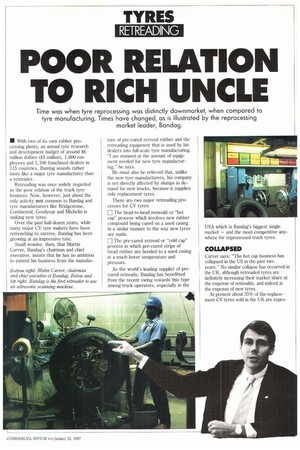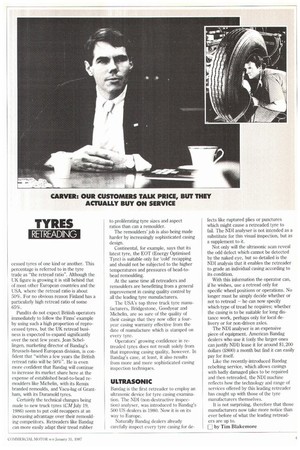POOR RELATION TO RICH UNCLE
Page 9

Page 11

If you've noticed an error in this article please click here to report it so we can fix it.
Time was when tyre reprocessing was distinctly downmarket, when compared to tyre manufacturing. Times have changed, as is illustrated by the reprocessing market leader, Bandag.
• With two of its own rubber processing plants, an annual tyre research and development budget of around $6 million dollars (E4 million), 1,600 employees and 1,100 franchised dealers in 115 countries, Bandag sounds rather more like a major tyre manufacturer than a retreader.
Retreading was once widely regarded as the poor relation of the truck tyre business. Now, however, just about the only activity not common to Bandag and tyre manufacturers like Bridgestone, Continental, Goodyear and Michelin is making new tyres.
Over the past half-dozen years, while many major CV tyre makers have been retrenching to survive, Bandag has been growing at an impressive rate.
Small wonder, then, that Martin Carver, Bandag's chairman and chief executive, insists that he has no ambition to extend his business from the manufac
Bottom right: Matin Carver, chairman and chief executive of Bandag. Below and top right: Bandag is the first retreader to use an ultrasonic scanning machine.
ture of pre-cured retread rubber and the retreading equipment that is used by his dealers into full-scale tyre manufacturing. "I am stunned at the amount of equipment needed for new tyre manufacturing," he says.
He must also be relieved that, unlike the new tyre manufacturers, his company is not directly affected by slumps in demand for new trucks, because it supplies only replacement tyres.
There are two major retreading processes for CV tyres:
O The bead-to-bead remould or "hot cap" process which involves new rubber compound being cured on a used casing in a simlar manner to the way new tyres are made.
Ei The pre-cured retread or "cold cap" process in which pre-cured strips of tread rubber are bonded to a used casing at a much lower temperature and pressure.
As the world's leading supplier of precured retreads, Bandag has benefitted from the recent swing towards this type among truck operators, especially in the USA which is Bandag's biggest single market — and the most competitive anywhere for reprocessed truck tyres.
COLLAPSED
Carver says: "The hot cap business has collapsed in the US in the past two years." No similar collapse has occurred in the UK, although retreaded tyres are definitely increasing their market share at the expense of remoulds, and indeed at the expense of new tyres.
At present about 35% of the replacement CV tyres sold in the UK are repro
cessed tyres of one kind or another. This percentage is referred to in the tyre trade as "the retread ratio". Although the UK figure is growing it is still behind that of most other European countries and the USA, where the retread ratio is about 50%. For no obvious reason Finland has a particularly high retread ratio of some 65%.
Pundits do not expect British operators immediately to follow the Finns' example by using such a high proportion of reprocessed tyres, but the UK retread business is expected to expand significantly over the next few years. Jean Schellingen, marketing director of Bandag's Brussels-based European division, is confident that "within a few years the British retread ratio will be 50%". He is even more confident that Bandag will continue to increase its market share here at the expense of established bead-to-bead remoulders like Michelin, with its Rernix branded remoulds, and Vacu-lug of Grantham, with its Duramold tyres.
Certainly the technical changes being made to new truck tyres (CM July 19, 1986) seem to put cold recappers at an increasing advantage over their remoulding competitors. Retreaders like Bandag can more easily adapt their tread rubber to proliferating tyre sizes and aspect ratios than can a remoulder.
The remoulders' job is also being made harder by increasingly sophisticated casing design.
Continental, for example, says that its latest tyre, the EOT (Energy Optimised Tyre) is suitable only for 'cold' recapping and should not be subjected to the higher temperatures and pressures of bead-tobead remoulding.
At the same time all retreaders and remoulders are benefitting from a general improvement in casing quality control by all the leading tyre manufacturers.
The USA's top three truck tyre manufacturers, Bridgestone, Goodyear and Michelin, are so sure of the quality of their casings that they now offer a fouryear casing warranty effective from the date of manufacture which is stamped on every tyre.
Operators' growing confidence in retreaded tyres does not result solely from that improving casing quality, however. In Bandag's case, at least, it also results from more and more sophisticated casing inspection techniques.
ULTRASONIC
Bandag is the first retreader to employ an ultrasonic device for tyre casing examination. The NDI (non-destructive inspection) analyser, was introduced to Bandag's 500 US dealers in 1980. Now it is on its way to Europe.
Naturally Bandag dealers already carefully inspect every tyre casing for de
fects like ruptured plies or punctures which might cause a retreaded tyre to fail. The NDI analyser is not intended as a substitute for this visual inspection, but as a supplement to it.
Not only will the ultrasonic scan reveal the odd defect which cannot be detected by the naked eye, but so detailed is the NDI analysis that it enables the retreader to grade an individual casing according to its condition.
With this information the operator can, if he wishes, use a retread only for specific wheel positions or operations. No longer must he simply decide whether or not to retread — he can now specify which type of tread he requires; whether the casing is to be suitable for long distance work, perhaps only for local delivery or for non-driven axles.
The ND1 analyser is an expensive piece of equipment. American Bandag dealers who use it (only the larger ones can justify NDI) lease it for around $1,200 dollars (g800) a month but find it can easily pay for itself.
Like the recently-introduced Bandag rebelting service, which allows casings with badly damaged plies to be repaired and then retreaded, the ND1 machine reflects how the technology and range of services offered by this leading retreader has caught up with those of the tyre manufacturers themselves.
It is not surprising, therefore that those manufacturers now take more notice than ever before of what the leading retreaders are up to.
by Tim Blakemore




















































































